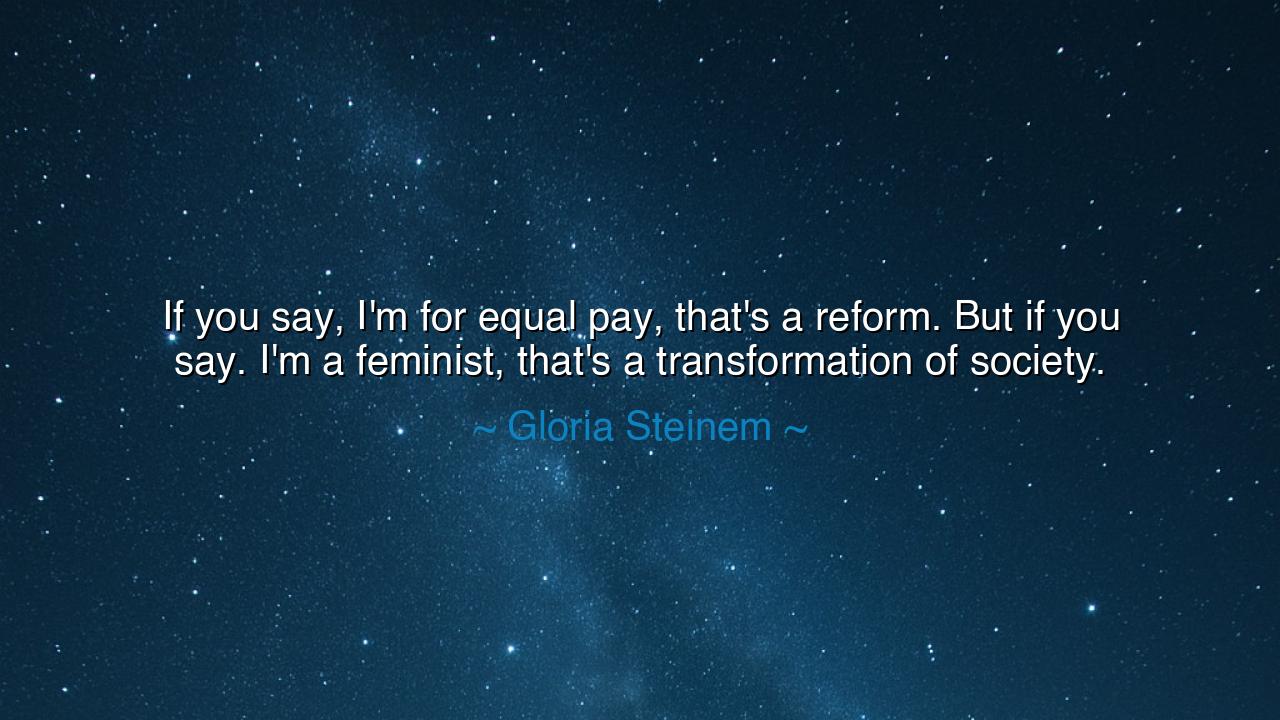
If you say, I'm for equal pay, that's a reform. But if you say.
If you say, I'm for equal pay, that's a reform. But if you say. I'm a feminist, that's a transformation of society.






Hear the voice of Gloria Steinem, one of the great heralds of women’s liberation, who declared: “If you say, I’m for equal pay, that’s a reform. But if you say, I’m a feminist, that’s a transformation of society.” These words shine like a torch, revealing the difference between a single step upon the path and the remaking of the path itself. For Steinem understood that reforms, though necessary, mend only fragments of a broken order, while true transformation requires reshaping the very foundation upon which that order stands.
The meaning is this: to demand equal pay is to call for fairness within the boundaries of the present system. It is a noble struggle, but it leaves intact the structures that have long upheld inequality. To declare oneself a feminist, however, is to go further—to challenge not only wages, but roles, expectations, power, and culture itself. It is to say that women must not merely be tolerated within the old order, but that the order itself must change to recognize their full humanity. This is why Steinem calls it a transformation of society.
History itself testifies to this distinction. In the early twentieth century, women fought for the right to vote. To grant that right was a reform, but the deeper battle was whether women were seen as full citizens in the eyes of the law. When the vote was won, some said the struggle was over. Yet women still faced exclusion in education, in professions, in politics, and in the family. True transformation demanded the ongoing force of feminism, a movement that asked not for scraps from the table, but for a redefinition of the table itself.
Consider too the struggles of the Civil Rights Movement. To desegregate buses, schools, and lunch counters was to win reforms—essential and life-changing. But the deeper vision, as Martin Luther King Jr. declared, was a “Beloved Community,” a transformed society where dignity and justice were not exceptions carved into law but principles woven into the very fabric of life. Steinem’s words echo this same truth: reform changes the rules, transformation changes the culture, the soul, the destiny of a people.
What Steinem reminds us is that feminism is not only about correcting inequalities one by one, but about questioning the very assumptions of power—who holds it, how it is used, and why it has been denied. To call oneself a feminist is to affirm that liberation cannot be partial. It is not enough for women to earn as men do if they are still silenced, dismissed, or diminished in other spheres. To embrace feminism is to seek a new balance of humanity, where freedom is not divided by gender, but shared by all.
The lesson for us is this: do not be content with small victories alone. Seek them, yes, for they bring relief to the suffering. But do not mistake them for the fullness of justice. True change is not a patch sewn onto an old garment, but the weaving of a new cloth. To say “I am for equal pay” is to ask for fairness in one domain. To say “I am a feminist” is to declare that you are part of a greater struggle, one that seeks to transform not only laws but hearts, not only wages but the way we see one another.
Therefore, let us act wisely. Support reforms, for they matter in daily life. But lift your vision higher. Ask not only, “What law can be passed?” but also, “What society must be built?” Teach your children that equality is not merely arithmetic but dignity. Live in such a way that your daily choices—how you work, how you speak, how you treat others—become acts of transformation. For the greatest revolutions are not only written in constitutions, but lived in the quiet courage of everyday life.
So let Steinem’s words be passed down: “If you say, I’m for equal pay, that’s a reform. But if you say, I’m a feminist, that’s a transformation of society.” May we never stop striving for reforms, but may we also never forget the higher calling—to transform the very order of our world until justice is not granted as favor, but flows as the natural law of human community. In this lies the true work of our generation, and the gift we must leave to the next.






AAdministratorAdministrator
Welcome, honored guests. Please leave a comment, we will respond soon